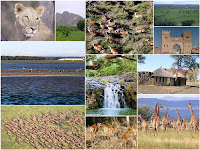South Sudan: which way forward?
 |
| Sudan's Oil Fields Map |
....with new nationhood comes tough decisions and new pressures. Multinational companies seeking to exploit the nation's vast natural resources are expected to arrive in South Sudan, tempting them with promises of development and economic growth, promises that have proven uneven at best across Africa. Dubbed the resource curse, many poor nations have seen their rich, natural resources plundered for the world market, but instead of reaping the financial rewards, money is lost in poorly-made deals or commodity swings, or ends up in the pockets of foreign corporations or corrupt officials, leaving the nation's people not with education and opportunity, but environmental degradation and social unrest. Dependent on oil (98% of the government's revenue comes from oil) and shockingly poor (90% of the people live on less than a dollar a day), South Sudan is perfectly situated for a resource-curse repeat.
With some of the continent's biggest herds—and therefore some of the best wildlife viewing in the world—South Sudan could become an eco-tourism hub. Tourism in such a place is nothing to sniff at: Kenya estimated it would make over $1 billion in revenue from tourism in 2010. And unlike oil, tourism doesn't run dry, so long as South Sudan makes forward-thinking conservation a priority.
Protecting watersheds and forests will greatly benefit the people of South Sudan, who are mostly agriculturalists and herders, by preserving precious ecosystem services. Smart partnerships with open-minded NGOs could help the people of Sudan grow more food, gain improved heath care, receive education, improve infrastructure, and essentially live better while preserving their ecosystems.
In an age when the world's great renewable and necessary resources—i.e. water, forests, biodiversity—are vanishing, South Sudan, if it plays its cards right, could retain unprecedented wealth in nature and be seen as nation for a new world.South Sudan doesn’t have to repeat the resource curse. Most African countries with oil, have not done well at all. To most, oil has only brought corruption, conflicts, misery for people and extreme environmental destruction. South Sudan is lucky that it can learn from the mistakes of these countries that have misused and mismanaged their resources.
+ Sudan's Oil Fields Map from the BBC


